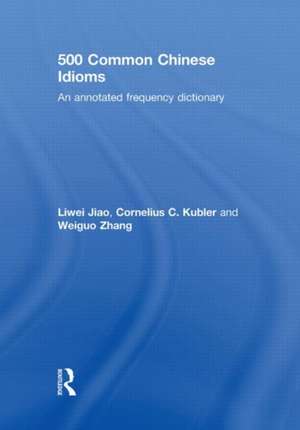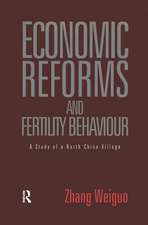500 Common Chinese Idioms: An Annotated Frequency Dictionary
Autor Liwei Jiao, Cornelius Kubler, Weiguo Zhangen Limba Engleză Hardback – 23 noi 2010
- The idiom in both simplified and traditional characters
- The idiom in pinyin romanisation
- A literal English translation and English equivalents
- Two suitable example sentences, plus explanations and usage notes
The dictionary offers a step-by-step approach to gaining greater fluency through a grasp of the most common idioms in the language, making it the ideal resource for the intermediate learner of Chinese and for Chinese language teachers. The book is also accompanied by recordings of all 500 idioms, available free through the companion website.
| Toate formatele și edițiile | Preț | Express |
|---|---|---|
| Paperback (1) | 380.74 lei 3-5 săpt. | +27.94 lei 7-13 zile |
| Taylor & Francis – 24 noi 2010 | 380.74 lei 3-5 săpt. | +27.94 lei 7-13 zile |
| Hardback (1) | 853.43 lei 6-8 săpt. | |
| Taylor & Francis – 23 noi 2010 | 853.43 lei 6-8 săpt. |
Preț: 853.43 lei
Preț vechi: 1181.50 lei
-28% Nou
Puncte Express: 1280
Preț estimativ în valută:
163.30€ • 177.94$ • 137.61£
163.30€ • 177.94$ • 137.61£
Carte tipărită la comandă
Livrare economică 23 aprilie-07 mai
Preluare comenzi: 021 569.72.76
Specificații
ISBN-13: 9780415598934
ISBN-10: 0415598931
Pagini: 328
Dimensiuni: 174 x 246 mm
Greutate: 0.77 kg
Ediția:1
Editura: Taylor & Francis
Colecția Routledge
Locul publicării:Oxford, United Kingdom
ISBN-10: 0415598931
Pagini: 328
Dimensiuni: 174 x 246 mm
Greutate: 0.77 kg
Ediția:1
Editura: Taylor & Francis
Colecția Routledge
Locul publicării:Oxford, United Kingdom
Cuprins
1. Introduction 2. Technical Terms Employed in the Dictionary. 3. Dictionary: Entries Arranged According to Frequency 4. Appendices Appendix A: Phonetic Index of the 500 Highest-Frequency Idioms Appendix B: Stroke Index of the 500 Highest-Frequency Idioms Appendix C: Frequency Chart of the First 1,000 Idioms According to The People’s Daily Newspaper Corpus Appendix D: Common Idioms not Included in the Body of the Dictionary. Appendix E: Additional References and Websites for Chinese Idioms
Recenzii
'The authors have done a magnificent job explaining this important dimension in the use of Chinese. Learners will appreciate the care they have taken to ensure that the material is maximally relevant and clear. The dictionary will be an invaluable aid to both comprehension and production.'- Professor David Crystal
"Grounded in corpus research, this dictionary has a number of laudable features: with focused attention on learner usage, entries are clearly analyzed, exemplified and contextualized."- Zheng-sheng Zhang, San > Diego State University, USA
"500 Common Chinese Idioms is…possibly the first lexicographical work that thoroughly and consistently lists the Chinese characters, pinyin, and English translation for entries and example sentences. This feature makes it more complete and considerate than most Chinese idiom dictionaries and turns it into a learner-friendly textbook….students will appreciate the authors’ copious examples…Readers will find the well-written allusions to be an enjoyable experience as if they were reading a literary piece of work....(This is) an indispensable reference for readers.….As a frequency dictionary, 500 Chinese Common Idioms presents a beautiful marriage between a dictionary and a textbook… (It is) a quality resource in any Chinese learner and teacher’s library…. Its value extends beyond a supplementary textbook, a dictionary, or a collection of idiom stories." - Journal of the Chinese Language Teachers Association
"An important part of Chinese culture, idioms have a long history in China. Proper use of idioms often reflects education level and language skills. Because Chinese idioms are frequently associated with literary allusions, quotations, or metaphors ingrained in Chinese history and literature, they are rather challenging for non-native learners of Chinese to understand or use appropriately. Keeping learners' usage in mind, Jiao (Univ. of Pennsylvania), Kubler (Williams College), and Zhang (emer., Renmin Univ. of China) present the 500 most commonly used idioms, based on frequency statistics of large corpuses of language data used in both China and Taiwan….Readers will find the number of the entry, the idiom in simplified and traditional characters, Pinyin Romanization, English translation, example sentences, comments on usage, allusions, a note on sociolinguistic function, near synonyms, and antonyms. Material in the appendixes includes the common structural patterns of Chinese idioms. This volume is suitable for intermediate to advanced learners of Chinese when used in conjunction with a standard Chinese-English dictionary. Summing Up: Recommended. Upper-division undergraduates and above." - K. T. Wei, University of Illinois at Urbana-Champaign, USA
"A beautiful marriage between a dictionary and a textbook."
- Hsiang-Hua Chang, Oakland University
"500 Idioms and 500 Proverbs are groundbreaking in their overall design and stand out due to the authors’ meticulous effort. They are tailored for intermediate to advanced learners of Chinese and have set high standards for similar books in the years to come. I hope to see more such reference works from these authors." - Journal of the Chinese Language Teachers Association
The authors have done a magnificent job explaining this important dimension in the use of Chinese. Learners will appreciate the care they have taken to ensure that the material is maximally relevant and clear. The dictionary will be an invaluable aid to both comprehension and production.
Professor David Crystal
Grounded in corpus research, this dictionary has a number of laudable
> features: with focused attention on learner usage, entries are clearly
> analyzed, exemplified and contextualized."-
Zheng-sheng Zhang, San > Diego State University, USA
'As a frequency dictionary, '500 Common Chinese Idioms' presents a beautiful marriage between a dictionary and a textbook... Its value extends beyond a supplementary textbook, a dictionary, or a collection of idiom stories. Students and teachers of Chinese language, culture, and civilization will all find worthwhile materials for their studies/classes in this book.' - LinguistList
"Grounded in corpus research, this dictionary has a number of laudable features: with focused attention on learner usage, entries are clearly analyzed, exemplified and contextualized."- Zheng-sheng Zhang, San > Diego State University, USA
"500 Common Chinese Idioms is…possibly the first lexicographical work that thoroughly and consistently lists the Chinese characters, pinyin, and English translation for entries and example sentences. This feature makes it more complete and considerate than most Chinese idiom dictionaries and turns it into a learner-friendly textbook….students will appreciate the authors’ copious examples…Readers will find the well-written allusions to be an enjoyable experience as if they were reading a literary piece of work....(This is) an indispensable reference for readers.….As a frequency dictionary, 500 Chinese Common Idioms presents a beautiful marriage between a dictionary and a textbook… (It is) a quality resource in any Chinese learner and teacher’s library…. Its value extends beyond a supplementary textbook, a dictionary, or a collection of idiom stories." - Journal of the Chinese Language Teachers Association
"An important part of Chinese culture, idioms have a long history in China. Proper use of idioms often reflects education level and language skills. Because Chinese idioms are frequently associated with literary allusions, quotations, or metaphors ingrained in Chinese history and literature, they are rather challenging for non-native learners of Chinese to understand or use appropriately. Keeping learners' usage in mind, Jiao (Univ. of Pennsylvania), Kubler (Williams College), and Zhang (emer., Renmin Univ. of China) present the 500 most commonly used idioms, based on frequency statistics of large corpuses of language data used in both China and Taiwan….Readers will find the number of the entry, the idiom in simplified and traditional characters, Pinyin Romanization, English translation, example sentences, comments on usage, allusions, a note on sociolinguistic function, near synonyms, and antonyms. Material in the appendixes includes the common structural patterns of Chinese idioms. This volume is suitable for intermediate to advanced learners of Chinese when used in conjunction with a standard Chinese-English dictionary. Summing Up: Recommended. Upper-division undergraduates and above." - K. T. Wei, University of Illinois at Urbana-Champaign, USA
"A beautiful marriage between a dictionary and a textbook."
- Hsiang-Hua Chang, Oakland University
"500 Idioms and 500 Proverbs are groundbreaking in their overall design and stand out due to the authors’ meticulous effort. They are tailored for intermediate to advanced learners of Chinese and have set high standards for similar books in the years to come. I hope to see more such reference works from these authors." - Journal of the Chinese Language Teachers Association
The authors have done a magnificent job explaining this important dimension in the use of Chinese. Learners will appreciate the care they have taken to ensure that the material is maximally relevant and clear. The dictionary will be an invaluable aid to both comprehension and production.
Professor David Crystal
Grounded in corpus research, this dictionary has a number of laudable
> features: with focused attention on learner usage, entries are clearly
> analyzed, exemplified and contextualized."-
Zheng-sheng Zhang, San > Diego State University, USA
'As a frequency dictionary, '500 Common Chinese Idioms' presents a beautiful marriage between a dictionary and a textbook... Its value extends beyond a supplementary textbook, a dictionary, or a collection of idiom stories. Students and teachers of Chinese language, culture, and civilization will all find worthwhile materials for their studies/classes in this book.' - LinguistList
Descriere
500 Common Chinese Idioms is the ideal tool for all intermediate to advanced learners of Chinese. Based on a large corpora of authentic language data, it presents the 500 most commonly used Chinese idioms or ‘chengyu’.

















